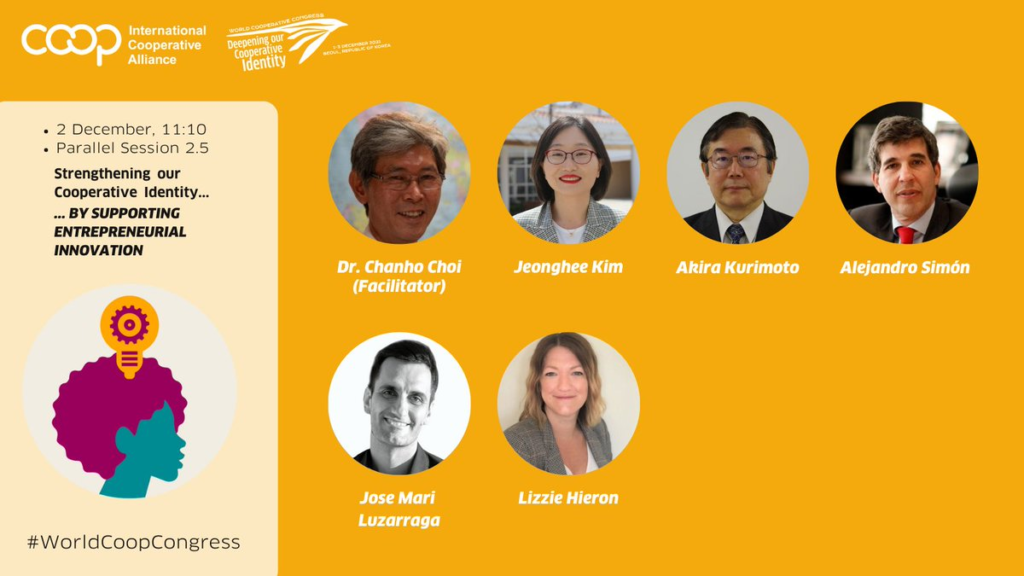
Cooperative entrepreneurship and innovation take many forms, delegates at the 33rd #WorldCoopCongress heard. But regardless of sector, a person-centred approach is key.
Opening the session, Dr Chanho Choi, Senior Consultant at the Korea Institute for Cooperative Development, reminded delegates that “for the first time in the ICA history, we are hosting a hybrid Congress, with an online and offline offering. This is itself very innovative.”
The session heard from Alejandro Simon, EO of Sancor Seguros & President of CITES (Centre for Technological, Business and Social Innovation), in Argentina, who looked at how cooperatives can contribute to the productive matrix of a country.
Akira Kurimoto fromthe Japan Co-operative Alliance, spoke about how entrepreneurial innovations can embody cooperative values and principles, giving three examples from Japan.
HAN neighbourhood groups (buying clubs) were set up by housewives in the mid 1960s, who wanted to buy unadulterated milk for their children. “This innovation combined cooperative business with member participation,” he said. The second example was the Sanchoku (‘direct transaction’) and Teikei (‘collaboration’) systems that were set up in the 1970s to bridge the gap between producer and consumers and have since been replicated in the USA, as community-supported agriculture. And finally, he spoke about community-based integrated care, where healthcare cooperativess,owned by users, prioritise user rights while building healthy communities through combining health promotion, medical treatment and long-term care.
“These innovations in Japanese coops directly reflect cooperative principles,” he said, “but it is important to involve both the busines side and the membership side so that both can develop.”
Jeonghee Kim, Chairperson, iCOOP, Korea, gave an overview of the business, and explained how it overcame crises by applying the cooperative identity to innovative solutions.
iCOOP has 300,000 consumer cooperative members and has 250 retail shops, and has faced some challenges over the last 30 years. The first crisis – of management and survival – took place in the late 1990s, and was addressed through looking at governance and member participation. A federation was set up to secure autonomy through democratic governance, while a monthly membership dues system was also implemented, to encourage member economic participation.
The second crisis was one of trust in 2003-4, where the accidental adulteration of imported agricultural produce dented member and consumer trust. This was addressed by setting standard inspections and setting up an internal distribution certification system, delivering the cooperative values of honesty and openness.
The third was around management inefficiencies and performance discrepancies that arose as the number of stores operated by member co-ops increased. “Because of this, we decided to focus on the essential and fundamental needs of the people in modern society. We found out that what people wanted was to overcome modern diseases; so we started to provide organic foods and promote lifestyle improvements.”
But, she added, we know that the needs of members are not fixed, but change over time. “That is why we need to innovate. We have to find the needs and we have to implement innovative ways to satisfy those needs.”
Lizzie Hieron joined the session from Midcounties Cooperative, one of the largest consumer cooperatives in the UK, owned and controlled by 700,000 members. “As a successful consumer cooperative, we believe we demonstrate entrepreneurial innovation through the embodiment of cooperative values and principles,” she said, describing how the organisation’s portfolio of businesses (including food, travel, childcare, energy and telecoms) provides trusted products and services to its members.
Part of this activity is exemplified by the organisation’s ‘One Change’ programme, which encourages members to make positive behavioural changes to tackle climate change, such as reducing single use plastics, buying Fairtrade products, or reducing carbon emissions. Midcounties also offers innovative solutions such as electric vehicle salary sacrifice and electric bike schemes, to colleagues so they can take advantage of low cost accessible and sustainable transport solutions.
“Entrepreneurial innovation has enabled our cooperatives to create commercial advantage, growing our member base and loyalty and in turn allowing us to deliver back benefits to our members, our colleagues, our communities and our planet,” she said.
Jose Mari Luzarraga, a Co-founder of Mondragon Team Academy (MTA World) described how 1 in 4 young people experience depression before adulthood, but that cooperatives had the opportunity to do things differently, to allow youth to flourish.
He described a “time of darkness” where “antihuman digitalization and economy monopoly is taking place”, with seven companies (Google, Amazon, Facebook (now Meta), Apple, Baidu, Alibaba and Tencent) drive 98% of internet cloud and data services. “But [Mondragon founder] JM Arizmendiaretta had a clear belief that ‘It is better to light up the match than to blame darkness’,” he said. “With this in mind, what if we allow ourselves to reimagine the way the world should be? What if we reimagine a new way of the role of the university where the structure, content and teacher-student relationship evolves?”
Mr Luzarraga described how Mondragon Team Academy has done just that: “We do not have students, they are not ‘the future’, they are actually people proving that together, they can transform the world by innovating and creating solutions for humanity.”
He added: “I do believe that with international cooperative Alliance coming together as a source of inter cooperation, we can give great hope to the world by changing the reality of how we run business”.
